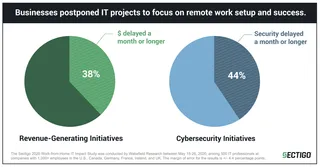Top Ten Takeaways from Sectigo's 2020 Work-from-Home IT Impact Study


The COVID-19 pandemic prompted unprecedented challenges for IT professionals worldwide as they scrambled to set up employees and operations to work securely in work-from-home (WFH) environments. Sectigo commissioned independent research firm Wakefield Research to survey 500 IT professionals to understand the impact that the coronavirus pandemic has had on organizations’ business, compliance, and security—and where they go from here.
Here are our Top Ten Takeaways from the survey findings:
- Nearly 40% of IT professionals surveyed report that their companies delayed revenue-generating initiatives for one month (44% delayed cybersecurity projects) so that IT teams could prioritize remote work setup.
- 86% report challenges in managing the digital identity of users, devices, and processes.
- At least half use authentication technologies with widely known vulnerabilities, such as traditional username/password (65%) and hardware-token multi-factor authentication (50%).
- Among the strong authentication methods, user identity certificates (56%) are far more prevalent than biometrics (26%).
- Phishing (40%) and Wi-Fi (40%) trump Zoom Bombing (28%) and unsecured BYOD devices (28%) on the list of top security concerns.
- 71% don’t feel completely confident that their company can report on full compliance with industry and government standards on digital identity during remote work.
- Nearly 60% expect security for data and applications to increase when offices reopen, yet 75% believe their company is investing “the right amount” on cybersecurity, despite concerns.
- IT pros expect to increase use of digital certificate-based authentication (38%) and digital document-signing solutions (35%) in the coming 12 months.
- 49% (63% of executives) feel employee productivity has increased since WFH began —with 35% saying productivity has stayed the same.
- 3 in 5 expect the number of remote workers will increase after their offices reopen.

Where do security teams go from here? It’s clear that this is not the time to shortchange investment in new security initiatives or to continue using weak security measures. While the increase in productivity is encouraging, the lack of emphasis on strong authentication leaves companies with notably higher risk.
User identity certificates offer advantages over phone- or token-based multi-factor authentication and simplify the process for remote employees to connect. With PKI-based certificates, an employee's identity certificate is stored directly in the computer, laptop, or mobile phone, enabling authentication without any action—and increasing a business’ overall security posture.
Survey Methodology
The 2020 Work-from-Home IT Impact Study was conducted by Wakefield Research (www.wakefieldresearch.com) between May 15th and May 26th, 2020, among 500 IT professionals at companies across industries with at least 1,000 employees in the U.S., Canada, Germany, France, Ireland, and UK. The margin of error for the results is +/- 4.4 percentage points.
For more information, download the study.
